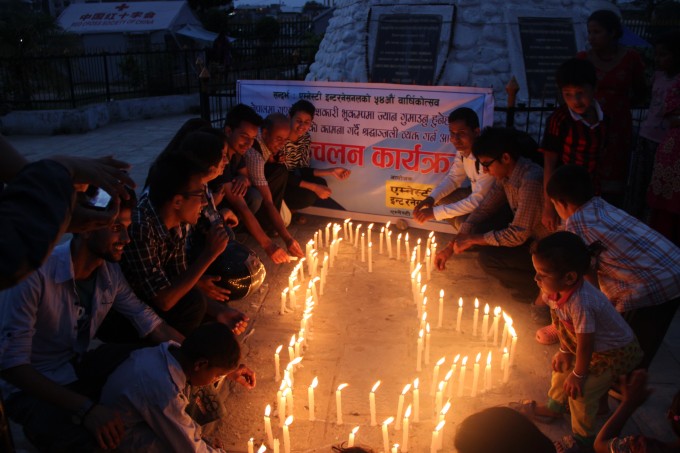여성과 어린이, 카스트 제도의 최하층인 달리트 계급, 선주민, 오지 주민들은 재건 과정에서 소외될 위험이 가장 큰 사람들이다.
리처드 베넷(Richard Bennett) 국제앰네스티 아시아국장은 “수많은 네팔 국민들이 여전히 지진 구호 물자가 절실히 필요한 상태다. 네팔 정부가 지적한 바와 같이, 우기가 시작되었는데도 수만 명은 여전히 적절한 피난처조차 없고, 농작물 추수까지는 3개월을 더 기다려야 하기 때문에 식량도 결코 충분하지 않은 상황”이라며 “가장 절실한 사람들에게 구호물자가 제공되는 것이 무엇보다 우선되어야 한다. 긴급 구호 물자의 반입을 신속하게 하려면, 일반 통관 절차를 포기하는 것이 마땅할 것”이라고 밝혔다.
유엔 발표에 따르면, 지난 4월 25일 발생한 대지진과 그 여파로 가장 큰 피해를 입은 14개 지역에서 약 280만 명이 인도적 지원을 필요로 하는 상태다. 약 80만 채의 가옥이 더 이상 주거가 불가능한 상태가 되었고, 10만 명 이상이 임시 거주지에서 생활하고 있지만, 이보다 훨씬 더 많은 수의 이재민들이 파괴된 집 근처에 임시 거처를 짓거나 친척과 함께 살고 있다.
주로 선주민에 속하는 수만 명은 대부분 도보 또는 헬리콥터로만 갈 수 있는 북부의 오지에 살고 있다. 이들은 응급주택의 생산 부족과 반입량 병목현상으로 최소한의 지원만을 받는 데 그치고 있다. 산사태로 인해 이주를 해야 하는 마을도 많다.
네팔 정부는 특히 여성과 어린이들이 성폭력과 인신매매, 조혼, 아동노동의 위험에 더욱 노출되고 있다고 경고했다.
국제앰네스티는 6월 2일 발표한 브리핑을 통해, 일부 개인과 단체가 사회 및 정치적 연줄을 이용해 구호물자를 받는 데 더욱 이익을 취하고 있으며 정작 가장 필요로 하는 사람들에게는 전달되지 못하고 있는 실태를 관찰했다.
국제앰네스티는 공여국들에게 구호에서 회복 절차로의 점진적 이행 과정을 효과적으로 모니터링하고, 가장 절박한 사람들이 간과되지 않도록 할 것을 촉구했다. 또한 네팔 국립인권위원회와 여성아동복지부가 공동 운영하고, 지진 피해자 인권 보호를 위해 인도주의적으로 대응하는 ‘보호영역(Protection Cluster)’ 협력단체에 대해 더욱 직접적인 지원을 제공해야 한다.
리처드 베넷 국장은 “재건사업이 엄청난 난관이라는 점을 인정하며, 공여국들은 중요한 역할을 수행하게 될 것이지만, 그 과정이 구호물자의 반입 경로를 축소해가면서까지 이루어져서는 안 된다. 가장 절박한 처지의 사람을 도움으로써 인권 보호라는 공동 책임을 함께 나누는 것이 인도주의적 원칙임에는 변함이 없다”고 말했다.
Nepal: Reconstruction must not leave behind those most affected by the earthquake
The Nepali government’s decision to declare the post-earthquake relief period over as of 22 June, along with its refusal to waive costly and time-consuming customs duties and procedures, could leave the most marginalized people without access to desperately needed aid, Amnesty International said ahead of tomorrow’s International Conference on Nepal’s Reconstruction.
Women, children, Dalits, Indigenous Peoples and those in very remote areas are most at risk of being left behind.
“Countless people in Nepal are still in desperate need of relief following the earthquake. As the government has pointed out, hundreds of thousands still lack adequate shelter even as the monsoon has started, while food is by no means secure for people who must wait another three months for the next harvest,” said Richard Bennett, Asia Director at Amnesty International.
“Getting aid to those who need it most must be the top priority. In order to expedite the import of emergency relief materials, particularly for shelter, the government should waive normal customs duties.”
According to the UN, some 2.8 million people remain in need of humanitarian assistance in 14 of Nepal’s most severely affected districts following the 25 April earthquake and its aftershocks. Nearly 800,000 homes are no longer habitable. More than 100,000 people are living in temporary settlements, but a much larger number of homeless are living in makeshift shelters near their destroyed homes or with relatives.
Hundreds of thousands, mainly members of indigenous communities, live in remote northern areas, many of which are only accessible on foot or by helicopter. They have received minimal assistance for emergency housing, due in part to production shortages and bottle-necks on imports. Many communities may face relocation due to landslides.
The Nepali government has warned that women and children in particular face a growing risk of sexual and gender-based violence, human trafficking, child marriage, and child labour.
In a briefing released on 2 June, Amnesty International observed that some individuals and groups benefitted from social and political connections in receiving aid, rather than it being delivered to those most in need.
The organization called on donors to ensure effective monitoring of a gradual transition from relief to recovery, ensuring that those most in need are not left behind. This should include more direct support to the Protection Cluster, the coordinating body co-led by the National Human Rights Commission and the Ministry of Women, Children and Social Welfare, responsible for ensuring that the humanitarian response protects the human rights of victims.
“We appreciate the enormous challenge of reconstruction and donors will play a crucial role in this – but this must not be at the expense of narrowing the channels of relief. The humanitarian imperative has not changed: we all share the collective burden of protecting human rights by assisting those most in need,” said Richard Bennett.

